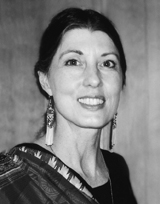By Betty Bland
 Excitement filled the air when more than 500 members from 39 different countries attended the Ninth World Congress of the Theosophical Society, held in Sydney, Australia, January 11 -18, 2001. Long-time friends and new ones among the many cultures represented at the Congress forged the bonds of brotherhood that cross all cultural boundaries. All were struck by our similarities, interest in the same studies, and concerns over the same issues.
Excitement filled the air when more than 500 members from 39 different countries attended the Ninth World Congress of the Theosophical Society, held in Sydney, Australia, January 11 -18, 2001. Long-time friends and new ones among the many cultures represented at the Congress forged the bonds of brotherhood that cross all cultural boundaries. All were struck by our similarities, interest in the same studies, and concerns over the same issues.
"The Future Role of the Theosophical Society" was the issue under consideration in the workshop series for which I was responsible. The hundred or so participants in this workshop first explored our roots, remembering our foundations in the Ancient Wisdom, the grand purposes espoused by our founders, and the pioneering spirit of our early workers. We then broke up into smaller groups to tackle our hopes for the future.
Each of the four groups considered three issues.
-
What should the Theosophical Society look like in the future (in its activities and outreach)?
-
What ought to be the role of the Theosophical Society in our world society (in its thrust or purpose)
-
What action plan might we adopt for each of the preceding two issues, both at the personal level and the organizational level?
During one of the last sessions of the Congress, each workshop leader reported to the whole body. Below is a summary of the points made during the discussions of our groups.
What ought to be the role of the problems
As in all efforts, one must first acknowledge the problems to be dealt with as one plans for the future. The most common problems are these:
-
What ought to be the role of the opposition to the Theosophical Society by some religions and cultures
-
Objections to our emblem and motto by some religious groups
-
Rigidity and authoritarianism among ourselves about what Theosophy is
-
What ought to be the role of the concern over how much change is appropriately generated by new or young people
-
Unwillingness on the part of some members to try new things
-
Budgetary constraints and fearfulness to take new actions
-
Quandary over whether or not to charge fees for our programs
-
Great need for more professionally skilled members
Future roles
We hope that in the future the Theosophical Society will be increasingly each of these:
-
A multicultural center of brotherhood
-
The guardian and transmitter of the Ancient Wisdom
-
A nucleus of socially and politically concerned members
-
A school of philosophy and spiritual education
-
A beacon of light for seekers
Four major areas of effort were identified as ways to achieve the ideal Theosophical Society of the future.
Welcoming
The reception of each new seeker who comes through our doors is so important that it was treated as the first category, with the following suggested actions:
-
Appoint greeters for every meeting
-
Set up mentorship or assign a big brother or sister for each new member
-
Have plenty of humor, smiles, and fun (The importance of this is not to be taken lightly.)
-
Hold periodic open-house events
-
Give new members jobs to do
-
Walk the talk
-
Include music and the arts
-
Remember the importance of the ambience of the lodge
-
Have open attitudes toward newcomers
Outreach
Although we do not view ourselves as evangelical, we recognize the importance of being visible and accessible to seekers. If we are not growing, we are dying. Here are some ideas for attracting newcomers:
-
Develop a good image and personal enthusiasm for the Theosophical Society
-
Use more modern terminology
-
Develop good posters, fliers, ads, and brochures
-
Maintain bookstores and libraries
-
Place Theosophical books in public libraries
-
Use technological tools, such as Websites, television, and radio
-
Use interaction with related groups as a way to become better known
-
Establish schools and educational programs for the young
Program focus
We should offer a variety of programs for those who attend our groups, such as these:
-
Presentations focused on the Ancient Wisdom
-
Applied Theosophy
-
Pathways for self-education and development
-
Encouragement for personal living skills and engaged living
-
Meditation
-
Social interaction promoting brotherhood
-
Group work in small groups
-
Interactive and experiential activities
-
Open dialog with new ideas
Organizational charges
Tasks requiring effort at the organizational level are these:
-
Produce multimedia to stimulate interest
-
Publish in other languages than English
-
Develop introductory courses for new members
-
Create packaged formats for talks and workshops
-
Share programs among groups and sections
-
Have more involvement with local groups
-
Publish the Theosophical classics in updated language
All of the workshop participants were amazed at the similarity among Theosophical groups everywhere, which have similar challenges and goals. We ended by challenging each other and all Theosophists to work together to achieve some of the aims listed above, asking each member to choose at least one or two items from the above lists to be their own personal project as a way of bringing about new visions of the Theosophical Society in the twenty-first century.
Betty Bland, a life member of the Theosophical Society, has served in local Study Centers, in the Mid South Federation, on the boards of several related organizations, and on the National Board for the last 14 years. She has been a teacher, employment counselor, and systems analyst. Now living in Pennsylvania, she operates a small business from her home.

